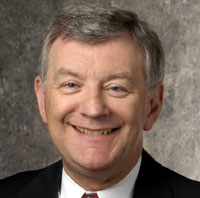Truth
Professor William B. Lawrence, dean of SMU's Perkins School of Theology, talks about the importance of truth and eventually discovering what it is in this essay for Public Radio.
By William B. Lawrence

At one point, Jesus did what everyone involved a trial has to do—he said he would tell the truth. Pilate, in a rather surprising moment of candor, responded with a question: “What is truth?”
Let’s give Pilate some credit for that. Like all major leaders in business and politics and government, he was a busy man with many things on his plate. All of us lose things from time to time. Somewhere along the way, Pilate lost track of truth. At least he was courageous enough to admit it.
We had a president in the 1990’s who looked the American people in the eye and insisted that he “did not have sexual relations with that woman, Ms. Lewinsky.” It took a while, but we learned that he had lost track of truth.
The next president and vice president insisted that Saddam Hussein had weapons of mass destruction. It took a while, but we learned that they had also lost track of truth and that no such material existed.
The late Robert McNamara spent the last few decades of his life acknowledging that he had lost track of truth during the 1960’s when he was in charge of the Vietnam War. It’s nice to know that he eventually rediscovered truth. But it’s too bad that 56,000 Americans, along with uncounted numbers of Vietnamese and Cambodians and Laotians, died while truth went missing.
Last year, my wife and I had an opportunity to visit the ruins of ancient Ephesus. At its height, around the time that Jesus was on trial before Pilate, Ephesus was a thriving city with a major wholesale and retail business, a theater that had more seats than the Myerson, an athletic stadium with a capacity equal to the ballpark at Arlington, and a library that was one of the two best in the world. As we made our way through the ruins and exited into the parking lot where our tour bus would meet us, we walked past dozens of vendors who wanted to sell us trinkets and souvenirs. One had a large yellow sign with big, black, block letters that read: “Genuine Fake Watches.”
I admired that vendor! He admitted that he was a liar and a fraud! I almost bought something just in appreciation for his candor.
We are in the midst of some major political struggles in our state and nation. A campaign to elect a new governor has begun. Wrestling over health reform legislation is continuing. And most of the noise generated so far has demonstrated that some of our leaders will abandon truth if they think it will give them an advantage. Pilate lost track of truth. And he landed on the wrong side of history. In the end, that’s what happens to liars.
# # #